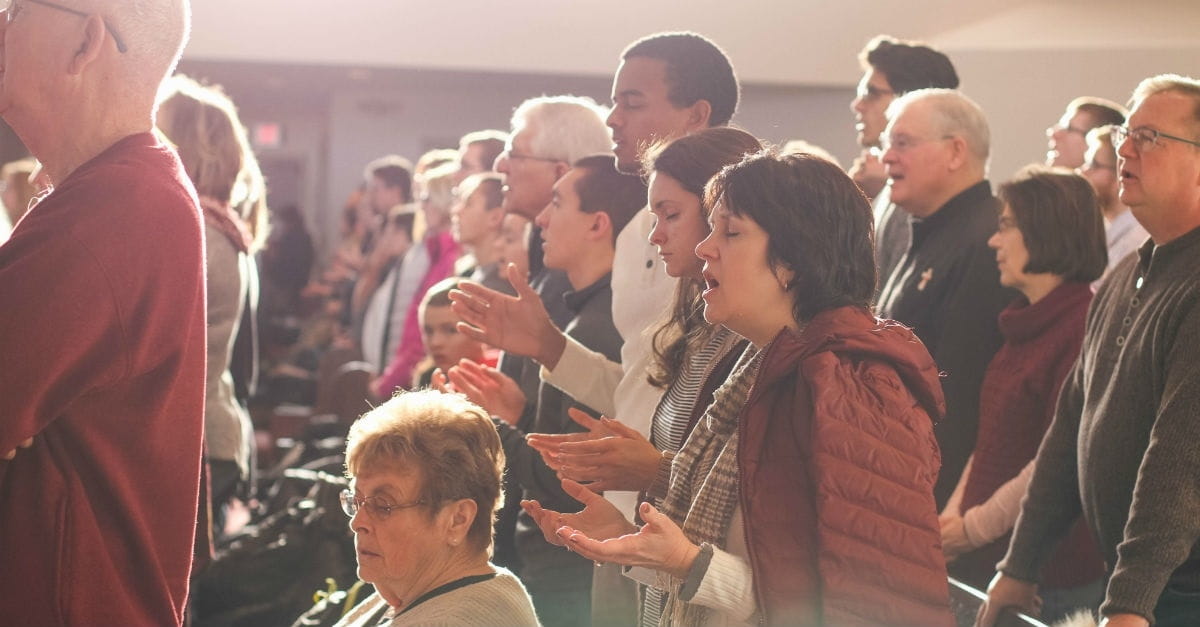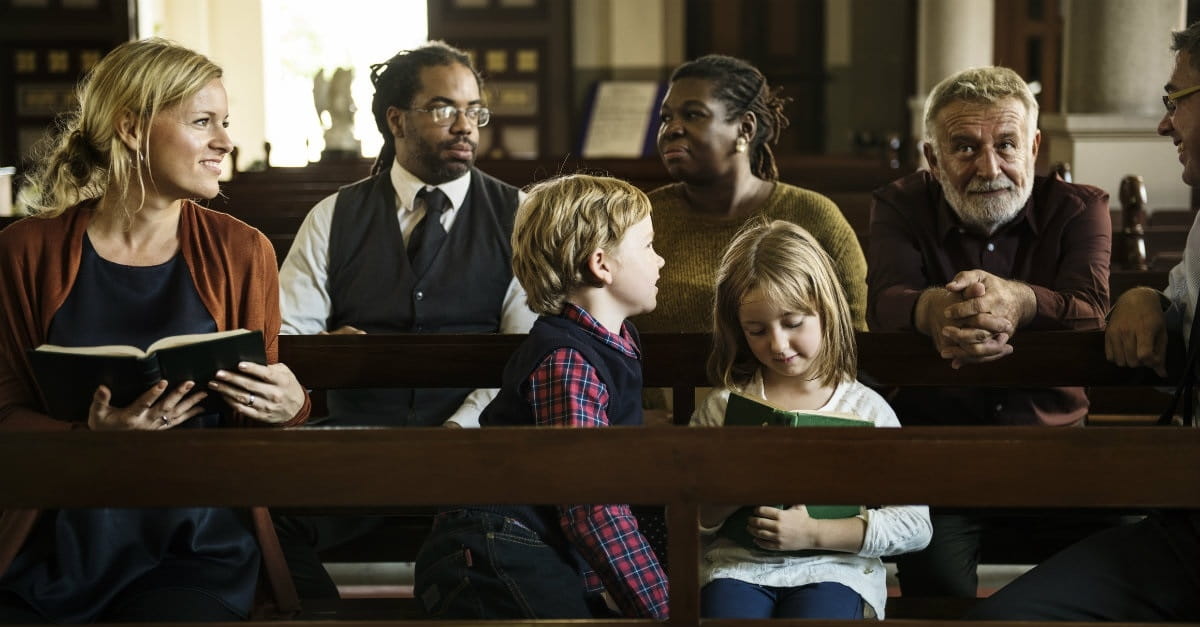
Myth #1: Evangelism is something I do myself.
The call to carry out the Great Commission feels heavy when we picture ourselves alone, laboring away to share good news. Anything in the Christian life feels heavy if I’m envisioning a rough road and myself walking along it by myself.
Stories from fellow travelers help light up the landscape. Stories, for example, of those who are reaching from Christ’s body outward—those who invite neighbors to a church Bible study group and who see those neighbors and their families gradually transformed by the gospel; those who host international students in their home, regularly bring them to church, and see some of them believe in Jesus; women whose brothers and sisters in Christ’s body have prayed for years with them for their husbands to come to faith. Interwoven through these stories are the hospitality and prayers of God’s people—specific prayers for the salvation of those they name together in God’s presence.
Photo Courtesy: Pexels
We Are Part of a Body

As a redeemed people, we bear witness to the good news that Jesus died on the cross, bore our sin, and rose from the grave, conquering death. Believing this good news makes us part of a body that lives and moves together toward seeing Jesus. We don’t do this evangelism thing alone.
Better to picture a road full of people walking together, sort of like we picture the Israelites walking up to the Jerusalem temple at feast time—whole groups and families, talking and singing and taking in others along the way. We’re God’s people. This is all God’s work. By his Spirit, God calls people to himself and gives them new life through faith in Christ. Those who have believed get to participate. He uses us. He uses us.
Photo Courtesy: Unsplash
Myth #2: We Don't Have to Speak the Gospel – We Just Live It

Should our lives touch people and transform culture first, before we speak? Do we need to speak? How do we manage this tension between verbal and nonverbal witness?
As believers, we can run to God’s Word to address and even embrace this tension. And the Word will tell us that God’s good news is a message to be proclaimed and believed: “Faith comes from hearing, and hearing through the word of Christ” (Rom. 10:17). We withhold the ultimate help if we withhold “the sacred writings, which are able to make you wise for salvation through faith in Christ Jesus” (2 Tim. 3:15).
But the Word also tells us that the gospel transforms lives, empowering doers and not just hearers—doers who, for example, care for orphans and widows in need (James 1:22, 27). If we have received the ultimate help, then we’ll offer it not just through words but also through transformed and transforming lives.
Photo Courtesy: Unsplash/Joshua Ness
Talk about Jesus While Building Relationships

We should perhaps take with more grains of salt the view that lengthy relationship-building is required before we earn the right to speak gospel truth. It does take time to minister in mercy and to build relationships. But I’d rather do that building with someone who is hearing me talk about Jesus in the process—with sensitivity and restraint, yes, but with confidence that the gospel is the best, most urgent news in the universe. If we wait a long time to speak, it usually becomes harder, more awkward, and more like there’s an elephant in the room.
Photo Courtesy: Thinkstock
Don't Underestimate Words

I’m reminded of a woman who moved across the globe to a country not generally friendly to Christianity. In her (successful) interview for a job at a local business, she told her potential employers about her Christian faith—because she figured that to be initially clear about her commitments would pave the way for more fruitful interactions on the subject. And indeed it has. Another friend across town has been able to show and explain the gospel through years of work in church-based ESL classes—and some of those students are now brothers and sisters in the Lord.
In her early years of marriage, a friend of mine didn’t know the Lord but was restless and searching. A man who showed up to fix a household appliance told her that Jesus loved her. That’s all he said. But she couldn’t get the words out of her mind. She got a Bible and read it, found a nearby church where in God’s providence the Bible was taught, and, in the end, both she and her husband came to faith in Christ.
I know: it doesn’t always or even usually happen that way. It did in that case, though. May we not underestimate the words that can be spoken during a plane or taxi ride, with a sales person or table server, or in the process of building a relationship.
Photo Courtesy: Pexels
Myth #3: Evangelism Requires Special Training

Don’t get me wrong: training in evangelism is extremely valuable. We can sharpen our articulation of the gospel, better grasp the Bible’s call to share it, learn more effective ways to listen and ask questions of people, and so forth.
But we don’t need to wait until we’re some sort of trained experts. The Samaritan woman who met Jesus at the well called the people of her town to come and see the man she had just met (John 4:29). She was so overjoyed by having met Jesus and found the promised Messiah that her joy naturally overflowed.
Photo Courtesy: Pexels
Participation in Church Body Life Can Be the Best Training

If we’ve just seen a great movie, that movie will often find its way into our conversation . . . usually with a lot of enthusiasm. It’s got to be true that if we’re regularly encountering the God of the universe speaking to us through his Word, then his Word will probably overflow into our conversations. Wouldn’t it be strange if it didn’t?
“Your daughter is living a life that shocks you, and you just don’t know how to relate to her? You know, I was just reading this amazing story about how Jesus related to a woman he met . . . ”
Maybe the best ongoing training is wholehearted participation in church body life, Bible study, prayer, service—those basic elements of the Christian life that help us grow to maturity.
Photo Courtesy: Thinkstock
Myth #4: It's Better Not to Talk about Hell

It must have been in second grade that I told one of my best friends about Jesus. The details are hazy, but what is not hazy is the experience of this friend asking me if I thought she would go to hell when she died if she didn’t believe in Jesus. As I recall, I told her I’d tell her the next day and then went home and asked my parents what to say—and I can’t remember what happened after that. I do remember being best of friends with her until we moved away, the summer after second grade.
It’s a dilemma that doesn’t go away as we get older. In some ways, it gets increasingly painful. We read and grapple with the Bible’s teaching about the final judgment of Jesus “in flaming fire, inflicting vengeance on those who do not know God and on those who do not obey the gospel of our Lord Jesus. They will suffer the punishment of eternal destruction, away from the presence of the Lord and from the glory of his might . . .” (2 Thess. 1:8-9).
It becomes so painful that a lot of people these days choose not to believe in hell, particularly as a place of torment “day and night forever and ever” (Rev. 20:10). Even as I type the words, I want to delete them. It’s tempting not to include this point. There would have been a lot of other, more positive ones to include, with a cap of just five myths.
Photo Courtesy: Kyle Loftus/Unsplash
Understanding God's Wrath Helps Us Take in the Cross

I hope my parents told me to be honest about hell; I’m guessing they did. The Bible—from beginning to end—is agonizingly honest about the wrath of God toward sin. The irony is that only in understanding a holy God’s just wrath can we take in the cross, where Jesus suffered that wrath in our place, bearing our sin.
This is something to talk about. In a recent conversation, a woman told me she wouldn’t want to have anything to do with a God who would ask a person to kill his son, like he asked Abraham to do. I asked this woman if she had read that story in the Bible and if she knew how it ended. She hadn’t and she didn’t. And I got to tell her about the ram God provided as a sacrifice on that mountain.
Photo Courtesy: Unsplash/Trung Thanh
Myth #5: I'll Get to it Eventually

If the eternal torment of hell is not a myth, but true, then the myth that we’ll eventually get to the task of evangelism is not only self-deluding but ultimately selfish. The question is whether invisible, eternal reality is or isn’t more real to me than visible, present comfort.
It was for Jesus. Recently reading through the gospel of John, I noticed again how often Jesus talks about his Father and being with his Father, in a way that shows how real to him was the invisible reality of God and heaven—it’s right there. That heaven-mindedness only intensified his earthly work, day by day, all the way to the cross. May God help us set our minds on the real things above—the things that will, in a moment, burst through and become visible.
And then evangelism will be over. Think of it. The Lord God will call every single person who has ever lived, from all the corners of the globe and out of all the graves in the earth and seas, to stand before his throne. Do we believe this?
Photo Courtesy: Pexels
Ready to Speak the Good News

It’s Monday morning as I’m writing. Emails and deadlines are waiting. Family is waiting. In the midst of it, may God grant me grace to live today with my eyes open and my mind and heart full of the Word I heard just yesterday with my brothers and sisters and again this morning, as I set out for the day. May he make me ready to speak the good news, even as I aim to live it out. I’ll fail. I’ll bumble my words. But please, Lord, use me, use us, today.
This post is adapted from Joyfully Spreading the Word: Sharing the Good News of Jesus edited by Kathleen Nielson and Gloria Furman. The article first appeared on Crossway.org; used with permission.
Kathleen Nielson (PhD, Vanderbilt University) is an author and speaker who loves working with women in studying the Scriptures. After directing the Gospel Coalition’s women’s initiatives from 2010–2017, she now serves as senior adviser and book editor for TGC. She and her husband, Niel, make their home partly in Wheaton, Illinois, and partly in Jakarta, Indonesia. They have three sons, two daughters-in-law, and five granddaughters.
Photo Courtesy: Unsplash/Priscilla Du Preez